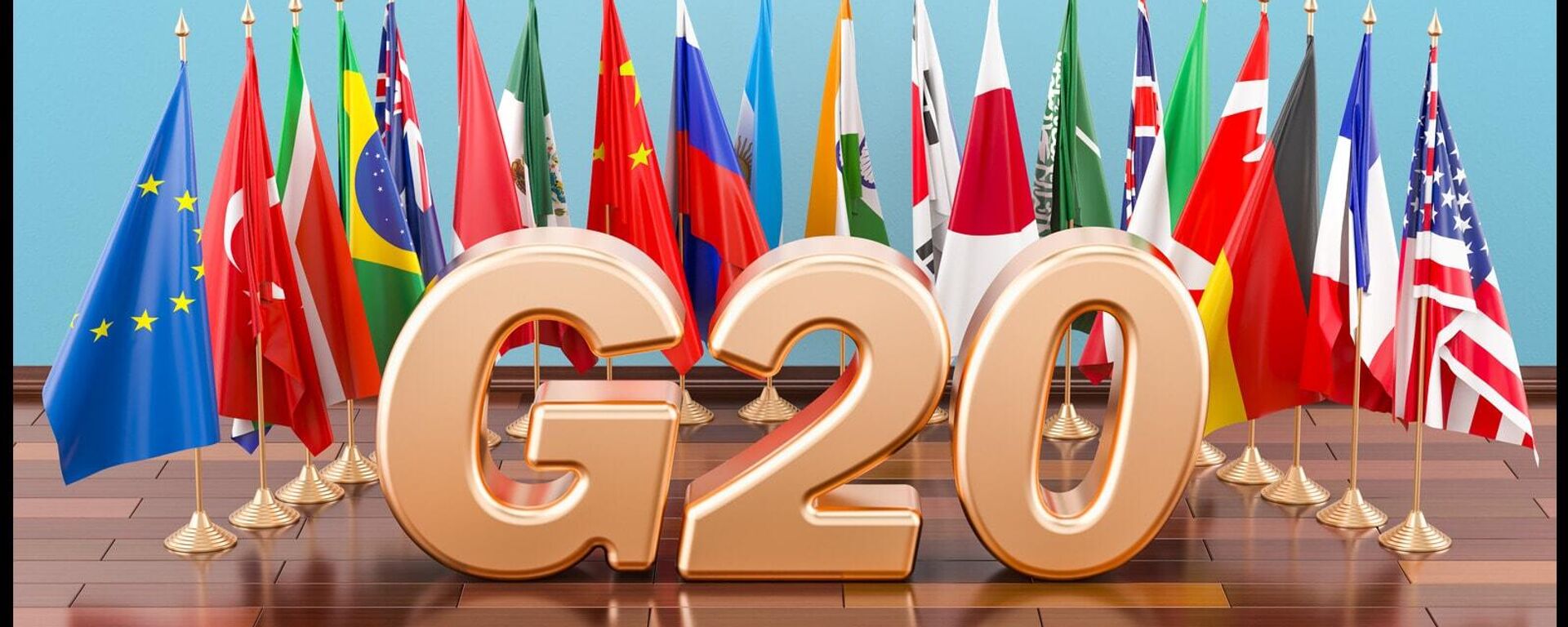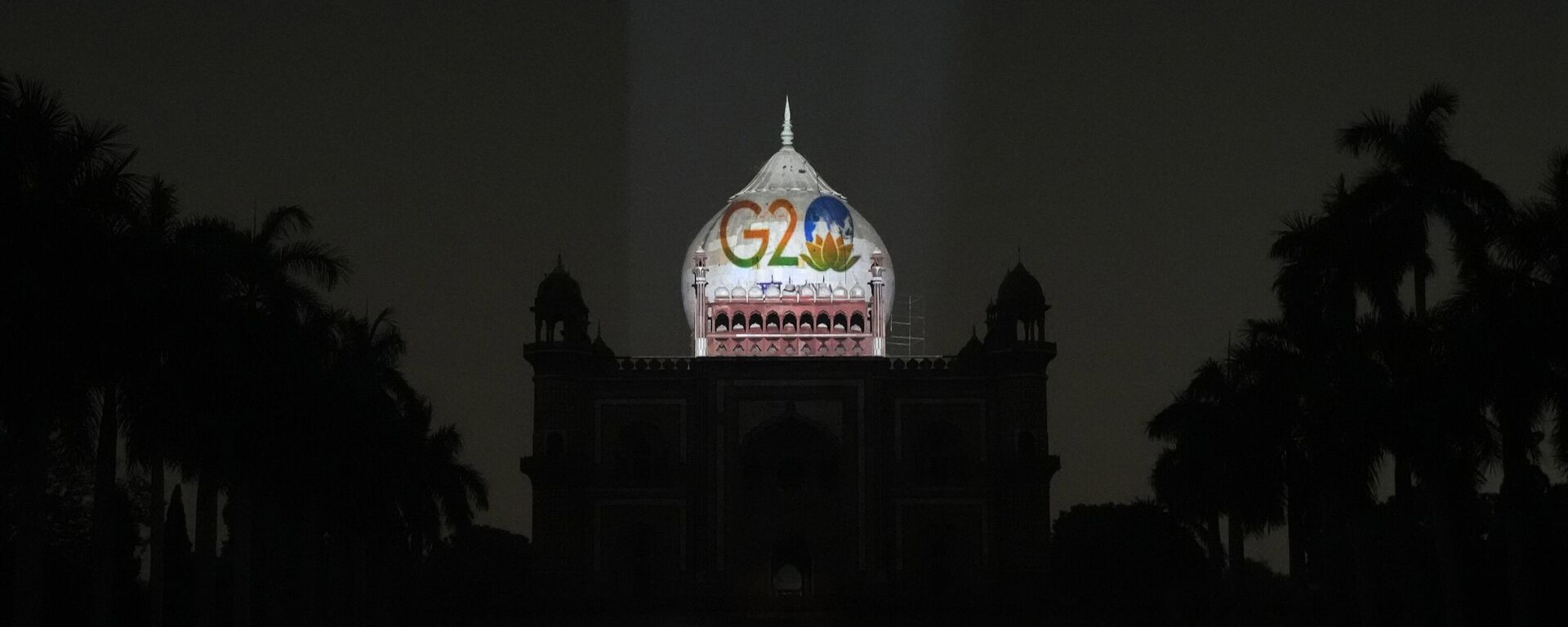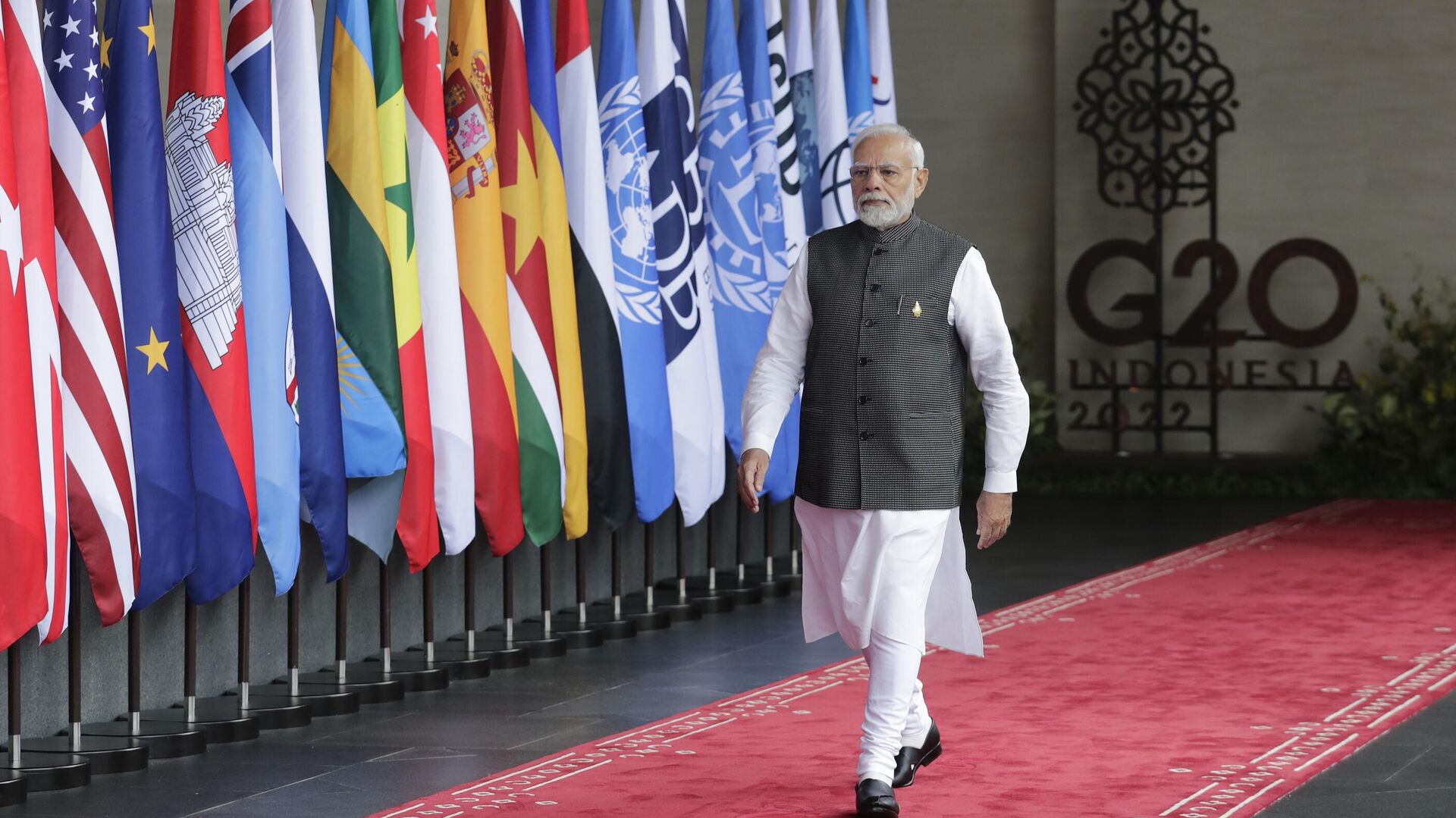https://sputnikglobe.com/20230831/what-is-g20-1112932278.html
What is G20?
What is G20?
Sputnik International
Unlike formal organizations, the Group of Twenty's informality is a forum for open dialogue among member states, fostering open dialogue and amplifying the group's soft power. With India currently holding the Presidency, the G20's 2023 theme reflects the interconnectedness of its agenda.
2023-08-31T09:00+0000
2023-08-31T09:00+0000
2023-09-01T12:27+0000
world
imf
brazil
indonesia
saudi arabia
european union (eu)
g7
g20
australia
canada
https://cdn1.img.sputnikglobe.com/img/07e6/0b/0f/1104140990_0:373:2809:1953_1920x0_80_0_0_d8009c475610ceb7e50d64b99df174de.jpg
The Group of Twenty, or G20, has emerged as a critical forum for international cooperation and decision-making in an increasingly interconnected world. From its inception in 1999, the G20 has successfully managed to steer the global economy through turbulent waters. The group was pivotal in stabilizing the global financial system during the 2008 financial crisis, coordinating stimulus measures and reforms that helped prevent a complete economic meltdown.One of the Group of 20's greatest strengths is its diplomatic charm. Unlike formal international organizations, the Group of Twenty Finance Ministers and Central Bank Governors operate informally, permitting frank dialogue and consensus-building among leaders. This format enables the group to exert significant influence on global affairs without the weight of binding commitments. Its ability to convene leaders from diverse cultures and political systems amplifies its influence, making it a key player in shaping global agendas.Sputnik sheds light on the group’s modus operandi, how they interface with other multilateral organizations, and the main facts about forthcoming G20 summit in New Delhi, India.What is the G20?The G20 is a multinational forum consisting of what were originally the 19 countries with the world's largest economies plus the European Union; it operates as a global platform that encompasses the leading developed and emerging economies worldwide.This group of 19 member nations collectively account for 85 percent of the world's GDP, manages 75 percent of international trade, and are home to two-thirds of the global population.Why was the G20 created?The G20 was established in 1999 in response to the 1997-98 Asian financial crisis, serving as a platform for Finance Ministers and Central Bank Governors to deliberate on worldwide economic and financial matters.Recognized as the exclusive club for transnational economic partnership, the Group of Twenty plays a crucial role in shaping and reinforcing the global structure and governance regarding all critical international economic challenges.What are the G20 Countries?The G20 operates without a permanent secretariat or staff. Instead, the G20 Presidency changes annually among its members and is selected from diverse regional clusters of countries. Hence, the 19 member nations are split into 5 groups, with 4 countries in each group.The majority of these groupings are structured regionally, with countries from the same geographic area typically placed in the same group.The first and second groups do not follow the regional grouping norm.As the 20th member, the EU is not affiliated with these regional clusters.Invitees include Spain, the United Nations, the African Union (the chair and a representative of New Partnership for Africa’s Development), and the chair of the Association of Southeast Asian Nations.Who is the President of G20?The G20 Presidency rotates annually among countries from diverse groups. Within each group, member states have an equal chance to assume the Presidency during their group's allotted term. Currently, India, a member of Group 2, holds the G20 Presidency from December 1, 2022, to November 30, 2023.The responsibilities of the G20 Presidency ensure the consolidation of the G20 agenda through consultations with fellow member nations in response to global economic shifts. To maintain a seamless transition, the Presidency receives support from a "Troika," ("Triad") consisting of the current, immediate past, and future host countries. During India's tenure as the present G20 Presidency, the "Troika" comprises Indonesia, India, and Brazil.How Does the G20 Work?The rotational G20 Presidency oversees the G20 agenda for a year and organizes the Annual G-20 Summit.The G20 comprises two separate paths:Additionally, there are Engagement Groups that convene representatives from think tanks, civil society organizations, labor unions, women groups, parliamentarians, youth organizations, local and international corporations, and researchers from the G20 member countries. The objective is to enable a robust collaborative discourse, fostering broader inclusion and participation in the design of global solutions.What is the G20 Summit?The G20 convenes yearly, under its formal title "Summit on Financial Markets and the World Economy," an annual gathering of finance ministers and heads of state representing member countries. India, the nation holding the rotating presidency, is responsible for hosting the annual summit meeting.The leaders' goal is to establish harmony for collective action, with their attention centered on several core issues.The aim is to wrap up the two-day assembly with a joint statement that binds all participants to a shared course of action, even though this statement lacks legal enforceability. However, individual meetings can sometimes take precedence over formal proceedings.In 2023, under India's leadership, the G20 will focus on the theme: “Vasudhaiva Kutumbakam” - a Sanskrit phrase, that means "The Earth is one family."The 2023 G20 Summit is on the horizon, as it's scheduled to be held on September 9 and 10 at 'Bharat Mandapam,' situated within the ITPO Convention Centre, Pragati Maidan in New Delhi.The Role of International Organizations in the G20 At the behest of each Presidency, prominent international organizations contribute to G20 gatherings by offering substantial insights and enhancing the discourse. In every G20 Working Group gathering, international multilateral organizations have engaged productively as participants, helping with data delivery and offering proposals on crucial issues.
https://sputnikglobe.com/20220913/india-to-host-g20-summit-on-september-9-10-2023-1100715956.html
https://sputnikglobe.com/20221202/unesco-world-heritage-sites-illuminated-with-g20-logo-across-india---1104968546.html
brazil
indonesia
saudi arabia
australia
canada
Sputnik International
feedback@sputniknews.com
+74956456601
MIA „Rossiya Segodnya“
2023
Chimauchem Nwosu
https://cdn1.img.sputnikglobe.com/img/07e7/09/01/1113046371_0:99:1536:1635_100x100_80_0_0_9c5c627283eca931c39fe4852bbb301c.jpg
Chimauchem Nwosu
https://cdn1.img.sputnikglobe.com/img/07e7/09/01/1113046371_0:99:1536:1635_100x100_80_0_0_9c5c627283eca931c39fe4852bbb301c.jpg
News
en_EN
Sputnik International
feedback@sputniknews.com
+74956456601
MIA „Rossiya Segodnya“
Sputnik International
feedback@sputniknews.com
+74956456601
MIA „Rossiya Segodnya“
Chimauchem Nwosu
https://cdn1.img.sputnikglobe.com/img/07e7/09/01/1113046371_0:99:1536:1635_100x100_80_0_0_9c5c627283eca931c39fe4852bbb301c.jpg
g20, group of twenty, international cooperation, global economy, financial crisis, climate change, paris agreement, soft power, g20 countries, g20 presidency, g20 summit, 2023 g20 summit theme, g7, international organizations, oecd, imf, ilo, world bank, undp, iea, wto, unctad, global governance, transnational economic partnership, economic challenges, finance track, sherpa track, engagement groups, global solutions, vasudhaiva kutumbakam, interconnectedness, advanced economies, european union, argentina, australia, brazil, canada, china, france, germany, india, indonesia, italy, south korea, japan, mexico, russia, saudi arabia, south africa, turkey, united kingdom, united states, cooperation, decision-making, economic reforms, informal dialogue, binding commitments, diverse cultures, political systems, financial matters, structural policy agenda, youth employment, gender equality, fossil fuels, investment monitoring, tariffs, trade barriers.
g20, group of twenty, international cooperation, global economy, financial crisis, climate change, paris agreement, soft power, g20 countries, g20 presidency, g20 summit, 2023 g20 summit theme, g7, international organizations, oecd, imf, ilo, world bank, undp, iea, wto, unctad, global governance, transnational economic partnership, economic challenges, finance track, sherpa track, engagement groups, global solutions, vasudhaiva kutumbakam, interconnectedness, advanced economies, european union, argentina, australia, brazil, canada, china, france, germany, india, indonesia, italy, south korea, japan, mexico, russia, saudi arabia, south africa, turkey, united kingdom, united states, cooperation, decision-making, economic reforms, informal dialogue, binding commitments, diverse cultures, political systems, financial matters, structural policy agenda, youth employment, gender equality, fossil fuels, investment monitoring, tariffs, trade barriers.
The Group of Twenty, or G20, has emerged as a critical forum for international cooperation and decision-making in an increasingly interconnected world.
From its inception in 1999, the G20 has successfully managed to steer the global economy through turbulent waters. The group was pivotal in stabilizing the global financial system during the 2008 financial crisis, coordinating stimulus measures and reforms that helped prevent a complete economic meltdown.
One of the Group of 20's greatest strengths is its diplomatic charm. Unlike formal international organizations, the Group of Twenty Finance Ministers and Central Bank Governors operate informally, permitting frank dialogue and consensus-building among leaders. This format enables the group to exert significant influence on global affairs without the weight of binding commitments. Its ability to convene leaders from diverse cultures and political systems amplifies its influence, making it a key player in shaping global agendas.
Sputnik sheds light on the group’s modus operandi, how they interface with other multilateral organizations, and the main facts about forthcoming G20 summit in New Delhi, India.
The G20 is a multinational forum consisting of what were originally the 19 countries with the world's largest economies plus the European Union; it operates as a global platform that encompasses the leading developed and emerging economies worldwide.
This group of 19 member nations collectively account for 85 percent of the world's GDP, manages 75 percent of international trade, and are home to two-thirds of the global population.
The G20 was established in 1999 in response to the
1997-98 Asian financial crisis, serving as a platform for Finance Ministers and Central Bank Governors to deliberate on worldwide economic and financial matters.
Recognized as the exclusive club for transnational economic partnership, the Group of Twenty plays a crucial role in shaping and reinforcing the global structure and governance regarding all critical international economic challenges.
What are the G20 Countries?
The G20 operates without a permanent secretariat or staff. Instead, the G20 Presidency changes annually among its members and is selected from diverse regional clusters of countries. Hence, the 19 member nations are split into 5 groups, with 4 countries in each group.
The majority of these groupings are structured regionally, with countries from the same geographic area typically placed in the same group.
Group 1 (Australia, Canada, Saudi Arabia, and the United States).
Group 2 (India, Russia, South Africa, and Turkiye).
The first and second groups do not follow the regional grouping norm.
Group 3 (Argentina, Brazil, and Mexico).
Group 4 (France, Germany, Italy, and the United Kingdom).
Group 5 (China, Indonesia, Japan, and the Republic of Korea).
As the 20th member, the EU is not affiliated with these regional clusters.
Invitees include Spain, the United Nations, the African Union (the chair and a representative of New Partnership for Africa’s Development), and the chair of the Association of Southeast Asian Nations.

13 September 2022, 10:23 GMT
Who is the President of G20?
The G20 Presidency rotates annually among countries from diverse groups. Within each group, member states have an equal chance to assume the Presidency during their group's allotted term. Currently, India, a member of Group 2, holds the G20 Presidency from December 1, 2022, to November 30, 2023.
The responsibilities of the G20 Presidency ensure the consolidation of the G20 agenda through consultations with fellow member nations in response to global economic shifts. To maintain a seamless transition, the Presidency receives support from a "Troika," ("Triad") consisting of the current, immediate past, and future host countries. During India's tenure as the present G20 Presidency, the "Troika" comprises Indonesia, India, and Brazil.
The rotational G20 Presidency oversees the G20 agenda for a year and organizes the Annual G-20 Summit.
The G20 comprises two separate paths:
Finance Track - headed by Finance Ministers and Central Bank Governors, usually led by the Finance Ministry.
Sherpa Track - led by Sherpas, who supervise year-long negotiations, facilitate discussions on the Summit's agenda and synchronize the substantive activities of the G20.
Additionally, there are Engagement Groups that convene representatives from think tanks, civil society organizations, labor unions, women groups, parliamentarians, youth organizations, local and international corporations, and researchers from the G20 member countries. The objective is to enable a robust collaborative discourse, fostering broader inclusion and participation in the design of global solutions.
The G20 convenes yearly, under its formal title "Summit on Financial Markets and the World Economy," an annual gathering of finance ministers and heads of state representing member countries. India, the nation holding the rotating presidency, is responsible for hosting the annual summit meeting.
The leaders' goal is to establish harmony for collective action, with their attention centered on several core issues.
The aim is to wrap up the two-day assembly with a joint statement that binds all participants to a shared course of action, even though this statement lacks legal enforceability. However, individual meetings can sometimes take precedence over formal proceedings.
In 2023, under India's leadership, the
G20 will focus on the theme: “Vasudhaiva Kutumbakam” - a Sanskrit phrase, that means "The Earth is one family."

2 December 2022, 12:31 GMT
The 2023 G20 Summit is on the horizon, as it's scheduled to be held on September 9 and 10 at 'Bharat Mandapam,' situated within the ITPO Convention Centre, Pragati Maidan in New Delhi.
The Role of International Organizations in the G20
At the behest of each Presidency, prominent international organizations contribute to G20 gatherings by offering substantial insights and enhancing the discourse.
In every G20 Working Group gathering, international multilateral organizations have engaged productively as participants, helping with data delivery and offering proposals on crucial issues.
OECD - collaborate extensively on national growth strategies and the structural policy agenda as essential elements of the framework for robust, enduring, and equitable growth.
ILO on labor-related issues.
UNDP and other international organizations on development initiatives.
IEA on matters related to fossil fuels.
WTO and UNCTAD on investment monitoring, tariffs, trade barriers, etc.





